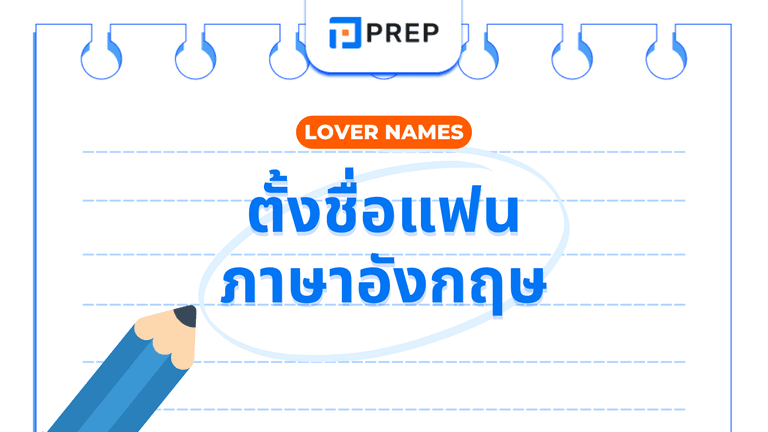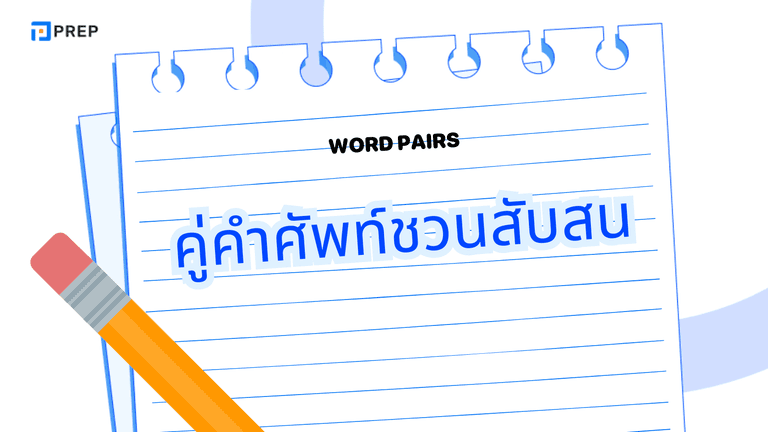เคล็ดลับการเขียน Two-part Questions ใน IELTS Writing Task 2 ให้ได้คะแนนดี
ใน IELTS Writing Task 2 ผู้เข้าสอบจะต้องเขียน Argumentative Essay เพื่อตอบคำถามที่กำหนดไว้ในหัวข้อ ซึ่งขึ้นอยู่กับความต้องการของหัวข้อแต่ละข้อ และคำถามใน Writing Task 2 สามารถแบ่งออกเป็นประเภทต่าง ๆ เช่น Opinion, Two-part questions, หรือ Discussion ดังนั้นในบทความนี้ PREP จะให้คำแนะนำอย่างครอบคลุมและละเอียดยิบ เกี่ยวกับวิธีการเขียน Two-part questions ใน IELTS Writing Task 2 ให้นักเรียน Preppies ทุกคน
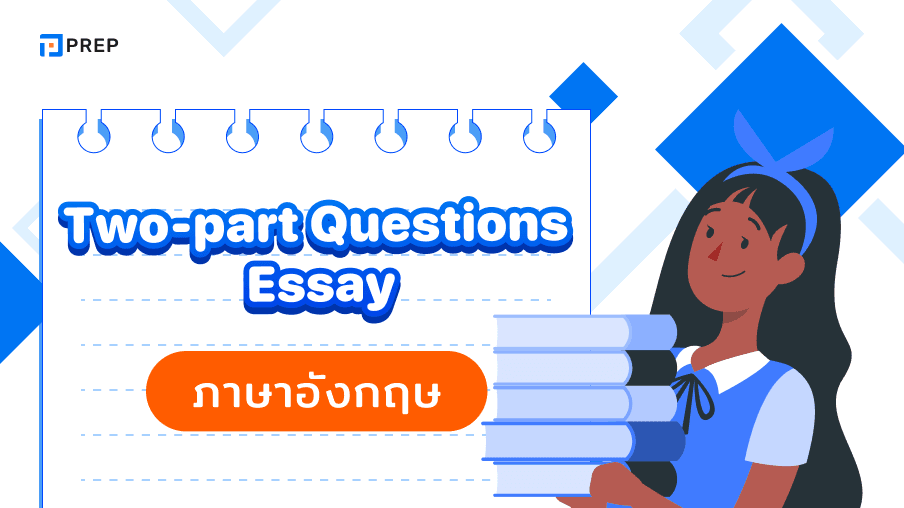
I. Two-part Questions ใน IELTS Writing Task 2 คืออะไร
Two-part Questions ค่อนข้างคล้ายกับการเขียนแบบ Problem-Solution โดยหัวข้อจะกล่าวถึงปัญหาหนึ่ง ๆ โดยเฉพาะแล้วจากนั้นจะถามผู้เขียนให้ตอบคำถามสองคำถามที่เกี่ยวข้องกับปัญหานั้น และคำถามเหล่านี้อาจเป็นหนึ่งในสี่ประเภทของการเรียงความก่อนหน้าหรืออาจเฉพาะแค่เฉพาะปัญหาที่กล่าวถึงเท่านั้น:
ตัวอย่าง:
- “Parents often give children everything they ask for and do what they like. Is it good for children? What are the consequences when they grow up?” ("พ่อแม่ให้ทุกอย่างที่ลูกขอและตามใจทุกอย่าง มันดีไหม และผลกระทบเมื่อพวกเขาเติบโตขึ้นคืออะไร")
- “Consumers are faced with increasing numbers of advertisements from competing companies. To what extent do you think are consumers influenced by advertisements? What measures can be taken to protect them?” ("ผู้บริโภคต้องเผชิญกับจำนวนโฆษณาที่เพิ่มขึ้นจากการที่บริษัทแข่งขันกัน คุณคิดว่าผู้บริโภคถูกอิทธิพลจากโฆษณามากน้อยแค่ไหน และมาตรการไหนที่สามารถนำมาใช้เพื่อปกป้องพวกเขา")
การเขียนรูปแบบนี้คล้ายกับการเขียนแบบ Problem-Solution โดยเราสามารถตอบแต่ละคำถามแยกกันในแต่ละย่อหน้าของเนื้อหา อย่างไรก็ตาม สิ่งสำคัญที่ต้องบันทึกไว้ว่า เราควรตอบทั้งสองคำถามอย่างครบถ้วนและหลีกเลี่ยงการตอบคำถามไหนอย่างละเอียดเกินไปจนไม่สนใจอีกคำถามหนึ่ง
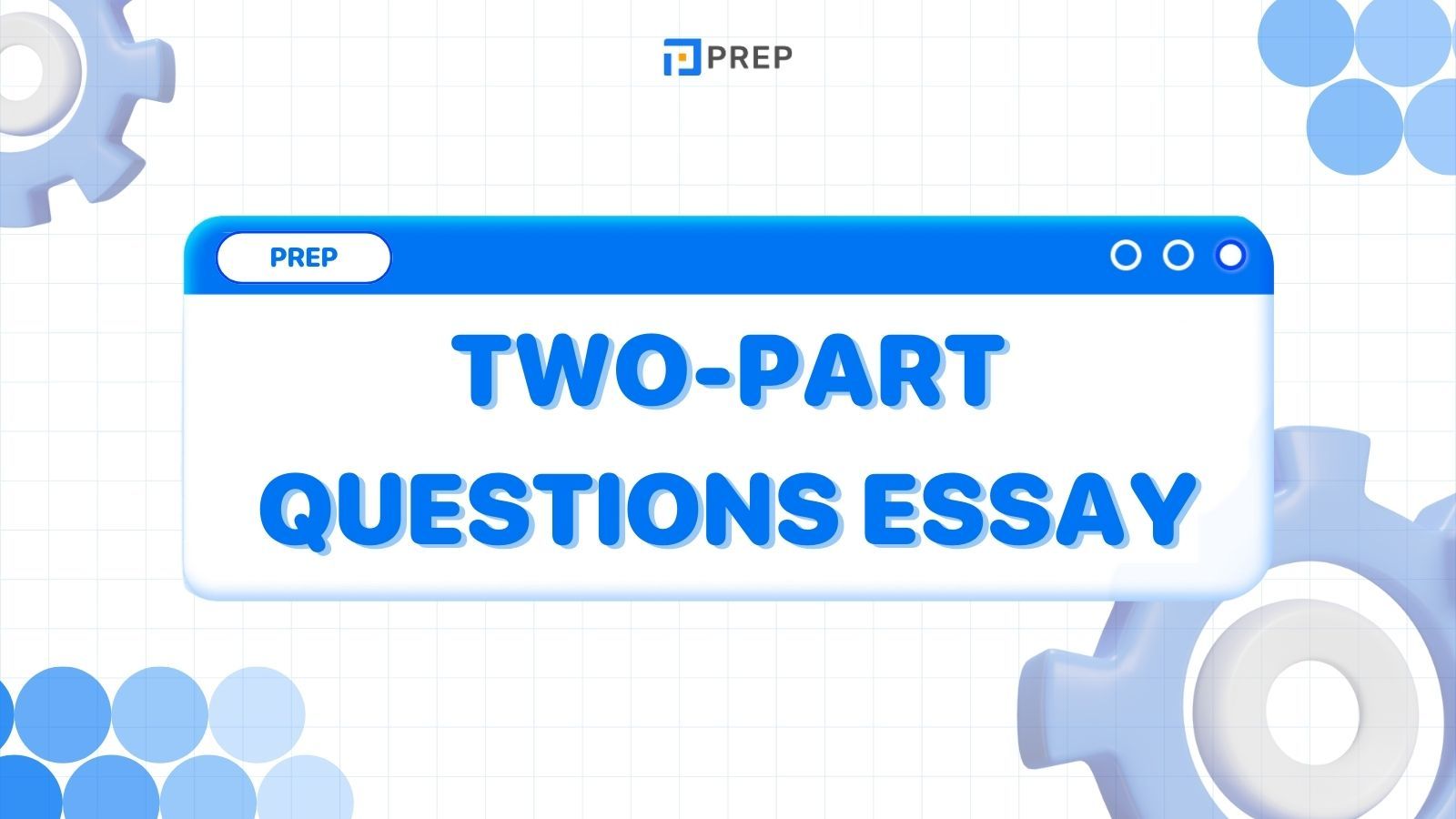
II. วิธีการสังเกต Two-part Questions ใน IELTS Writing Task 2
หมายเหตุ: Two-part Questions ใน IELTS Writing Task 2 ปกติแล้วไม่ได้มีคำถามเฉพาะ เพราะหัวข้ออาจจะให้ข้อมูลมาแล้วถามคำถามเกี่ยวกับข้อมูลเหล่านั้น
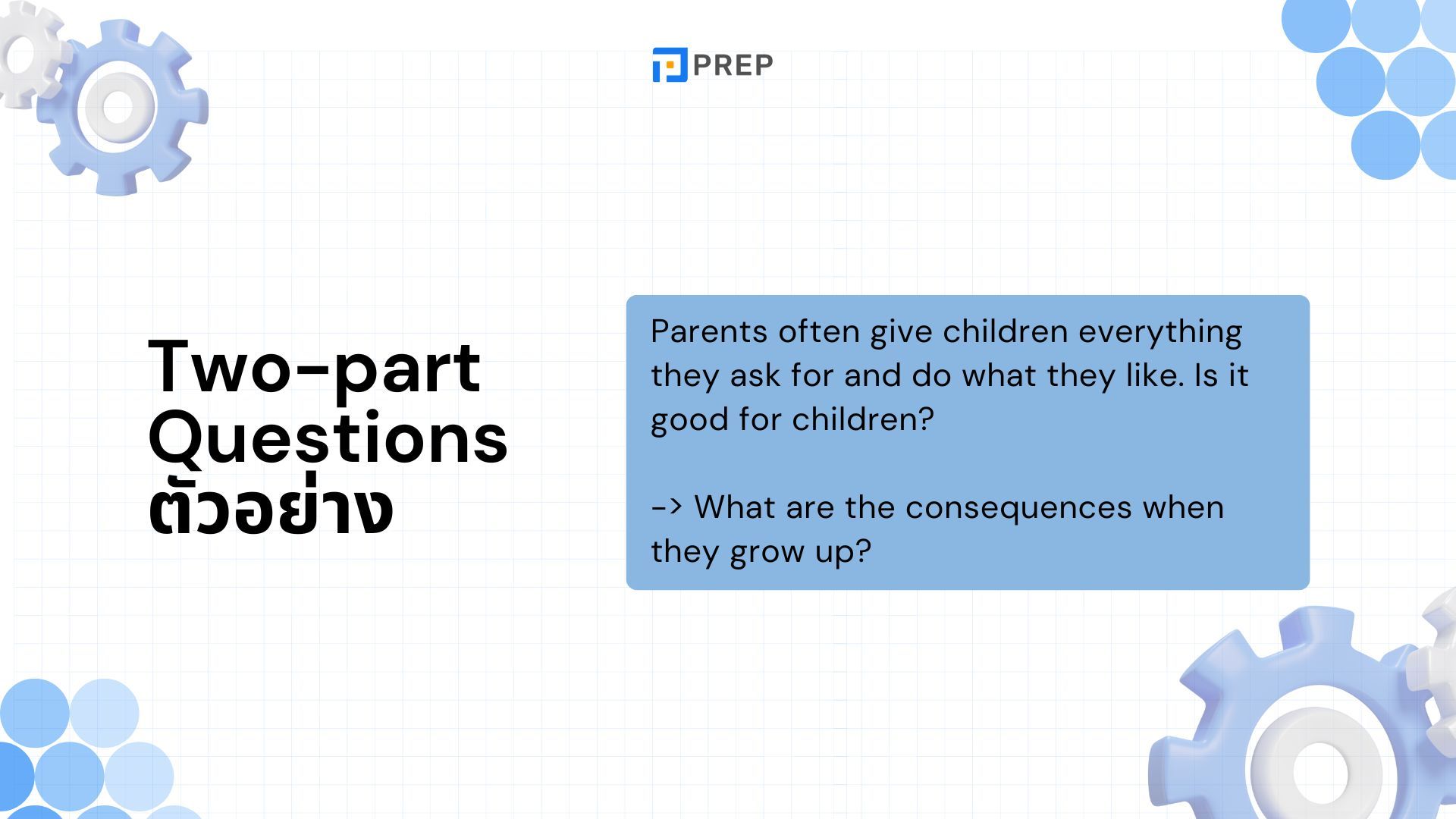
|
ประโยคนำที่เริ่มต้นประเด็น |
คำถามที่เกี่ยวข้องกับประเด็น |
|
Parents often give children everything they ask for and do what they like. Is it good for children? |
What are the consequences when they grow up? |
|
Consumers are faced with increasing numbers of advertisements from competing companies. |
To what extent do you think are consumers influenced by advertisements? What measures can be taken to protect them? |
III. โครงสร้างของ Two-part Questions ใน IELTS Writing Task 2
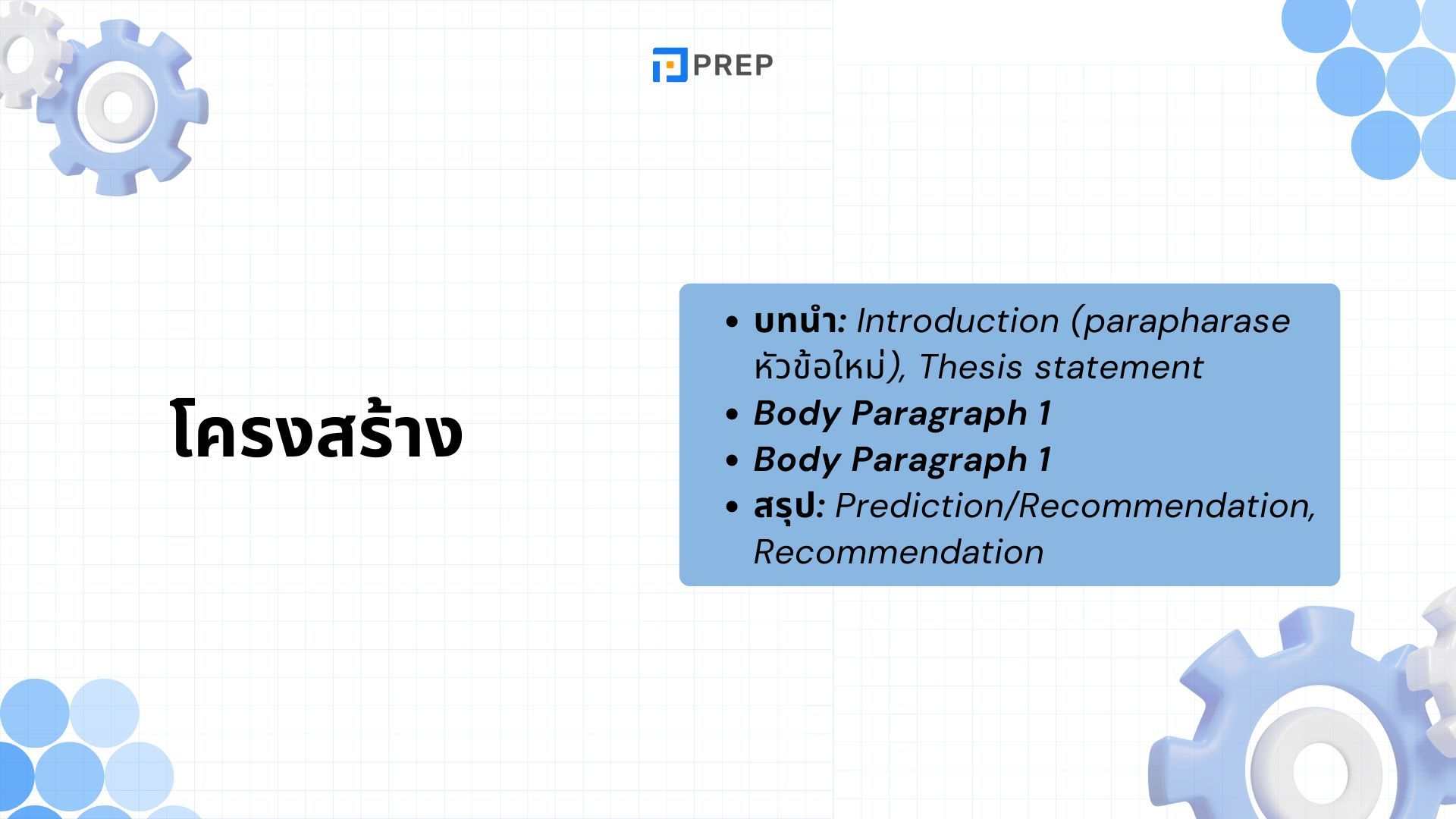
|
โครงสร้าง |
รายละเอียด |
|
Introduction |
|
|
Body Paragraph 1 |
|
|
Body Paragraph 2 |
|
|
Conclusion |
|
IV. ตัวอย่าง Two-part Questions ใน IELTS Writing Task 2
1. หัวข้อ IELTS Writing Task 2 เมื่อวันที่ 14 เมษายน 2018
1.1. หัวข้อ
“In today’s world of advanced science and technology, we still greatly value our artists such as musicians, painters, and writers. What can arts tell us about life that science and technology cannot?” ("ในโลกปัจจุบันที่วิทยาศาสตร์และเทคโนโลยีล้ำยุค เราก็ยังคงให้คุณค่ากับศิลปินอย่าง นักดนตรี จิตรกร และนักเขียนอยู่มาก อะไรที่ศิลปะสามารถบอกเราเกี่ยวกับชีวิต แต่วิทยาศาสตร์และเทคโนโลยีนั้นไม่สามารถทำได้?")
1.2. แนวคิด
What science and technology cannot tell people (สิ่งที่วิทยาศาสตร์และเทคโนโลยีไม่สามารถบอกผู้คนได้)
- Even the latest appliances of science and technology such as robots and even AI cannot imitate human emotions. (แม้แต่อุปกรณ์ล่าสุดของวิทยาศาสตร์และเทคโนโลยี เช่น หุ่นยนต์และ AI ก็ไม่สามารถเลียนแบบอารมณ์ของมนุษย์ได้)
- Machines function based on logic and a set of programmed principles and never sympathise or empathise in the way that humans do. (เครื่องจักรทำงานตามหลักการและชุดหัวข้อที่วางโปรแกรมไว้ และไม่เคยมีความเห็นอกเห็นใจแบบมนุษย์)
What arts can tell people (สิ่งที่ศิลปะสามารถบอกผู้คนได้)
- Pieces of art (paintings, songs, novels) can reflect how people feel and the emotions of the painters, song writers and writers. (ผลงานศิลปะ (ภาพวาด, เพลง, นวนิยาย) สามารถสะท้อนถึงความรู้สึกของผู้คน และอารมณ์ของจิตรกร, นักเขียนเพลง และนักเขียน)
- Art can inspire people to live a better life / can instil in people a sense of humanity. (ศิลปะสามารถสร้างแรงบันดาลใจให้ผู้คนใช้ชีวิตที่ดีขึ้น / สามารถปลูกฝังความเป็นมนุษย์)
2. หัวข้อ IELTS Writing Task 2 เมื่อวันที่ 25 พฤษภาคม 2017
2.1. หัวข้อ
“Parents often give children everything they ask for and do what they like. Is it good for children? What are the consequences when they grow up?” (“พ่อแม่ให้ทุกอย่างที่ลูกขอและตามใจทุกอย่าง สิ่งนี้ดีต่อเด็กหรือไม่ และผลกระทบเมื่อพวกเขาเติบโตขึ้นคืออะไร")
2.2. ตัวอย่าง
Indulging children has become a common parenting problem in many modern families. From a short-term perspective, this practice may slow down the process of children developing essential life skills. From a long-term standpoint, this may cause a sense of overdependence among children.
In the short term, it is possible that over-indulgence causes some delay to the process in which children learn important life skills. This can be seen in a variety of age groups, ranging from toddlers to teenagers. In Vietnam, for example, many over-caring parents spoon-feed their children until they are five or six, the developmental stage in which they should have already been able to eat independently. There is a common practice that parents assist their preadolescent children in taking a bath or a shower. These children, as a result, may fail to acquire basic personal hygiene skills at the right time.
In the long run, the consequences are even more dire as over-indulged children grow up. If parents satisfy all the needs of their children unconditionally, they may inadvertently make the children become over-reliant on them. When these children enter adulthood, the inability to live independently can cause some difficulties for them to maintain their overall well-being, such as not knowing what to do when they catch a fever. It is also a problem that over-indulgent parents are often lenient and do not require children to face the consequences of their misbehaviour. This deprives children of the opportunities to learn from mistakes, which may cause their problem-solving skills to be severely lacking in the future.
From the issues outlined above, one can conclude that overindulgence may produce a number of unfavourable effects on children, including the delay in gaining crucial life skills such as self-feeding and the long-term consequence of lacking the ability to cope with problems as adults in the future. It is recommended that no parents should overindulge their offspring.
285 คำ
อ่านบทความเพิ่มเติม
- วิธีเขียน Discussion Essay ใน IELTS Writing Task 2 ให้ได้คะแนนสูง
- วิธีเขียน Advantages and Disadvantages ใน IELTS Writing Task 2 ให้ได้คะแนนสูง
- เคล็ดลับการเขียน Opinion Essay IELTS Writing Task 2 พร้อมตัวอย่างที่น่าสนใจ
บทความนี้ได้ให้คำแนะนำโดยละเอียดเกี่ยวกับการเขียน Two-part Questions ใน IELTS Writing Task 2 สำหรับ Preppies ที่กำลังจะเข้าสอบ IELTS Writing Task 2 PREP เราหวังว่าบทความนี้จะเป็นประโยชน์ต่อผู้อ่านทุคกน นอกจากนี้ PREP ตั้งใจที่จะช่วยให้คุณเข้าใจวิธีการระบุรูปแบบคำถามอย่างท้าทายนี้และเข้าใจโครงสร้างของเรียงความชนิดนี้อย่างละเอียดจากบทความนี้ Prep พร้อมเสมอที่จะสนับสนุนคุณ เพื่อเริ่มเตรียมตัวสอบ IELTS ที่ prepedu.com ทันที!
PREP Edu นำเสนอกระบวนการตรวจสอบข้อเขียน Writing ที่ล้ำสมัย เทคโนโลยี AI จะคัดกรองข้อผิดพลาดด้านคำศัพท์และไวยากรณ์ที่อาจส่งผลต่อคะแนน พร้อมทั้งแนะนำวิธีการแก้ไขอย่างละเอียด ช่วยให้คุณพัฒนาทุกส่วนของบทความได้ดีขึ้น
ติวสอบ IELTS กับ PREP จะทำให้การพัฒนาทักษะ Writing ของคุณเป็นเรื่องง่ายและรวดเร็ว
สมัครหลักสูตร ที่นี่ หรือโทร HOTLINE +6624606789 เพื่อรับคำปรึกษา
ดาวน์โหลดแอป PREP เพื่อ เรียน IELTS Writing ที่บ้านและฝึกสอบออนไลน์ได้อย่างมีประสิทธิภาพ

สวัสดีค่ะ ฉันชื่อมุก ปัจจุบันดูแลด้านเนื้อหาผลิตภัณฑ์ของ Prep Education ค่ะ
ด้วยประสบการณ์มากกว่า 5 ปีในการเรียน IELTS ออนไลน์ด้วยตนเอง ฉันเข้าใจดีถึงความท้าทายที่ผู้เรียนต้องเผชิญ แล้วก็รู้ว่าอะไรที่มันเวิร์ก
มุกอยากเอาประสบการณ์ตรงนี้มาช่วยแชร์ แล้วก็ซัพพอร์ตเพื่อน ๆ ให้ได้คะแนนที่ดีที่สุดค่ะ
ความคิดเห็น
เนื้อหาแบบพรีเมียม
ดูทั้งหมดบทความที่เกี่ยวข้อง
แผนการเรียนรู้ส่วนบุคคล
อ่านมากที่สุด
ติดต่อ Prep ผ่านโซเชียล





